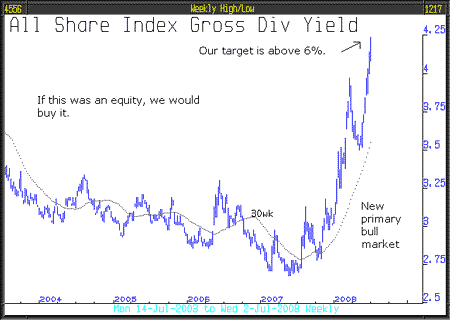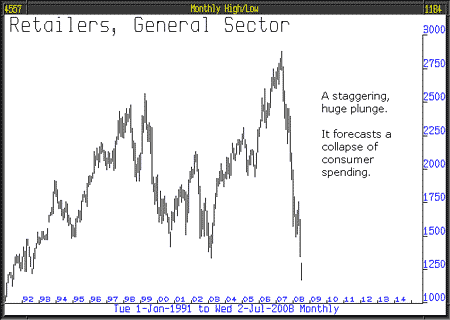Get the latest financial news, insights and expert analysis from our award-winning MoneyWeek team, to help you understand what really matters when it comes to your finances.
You are now subscribed
Your newsletter sign-up was successful
Want to add more newsletters?

Twice daily
MoneyWeek
Get the latest financial news, insights and expert analysis from our award-winning MoneyWeek team, to help you understand what really matters when it comes to your finances.

Four times a week
Look After My Bills
Sign up to our free money-saving newsletter, filled with the latest news and expert advice to help you find the best tips and deals for managing your bills. Start saving today!
Just four weeks ago, we said that the next leg down for the stock markets had started, and that has clearly proved to be the case. The FTSE 100 has held up a little better than most, not yet violating its March 2008 low nor its January 2008 low. Other key UK markets have broken down. For example, the FT30 - an index of 30 UK equities selected to represent the UK economy - and the FTSE 250, which more accurately represents the UK stock markets, have both made new lows.
In America, the Dow Jones Industrials and the S&P 500 have both violated this year's lows as have many of the European markets, including the Dow Jones Euro Stoxx 50. We don't think for one moment that this primary bear market will end until stock markets are much, much, much lower than now; probably below the levels set in 2003 which, to remind you, was for FTSE 3278 and for the Dow Jones 7417.
A few mainstream figures are beginning to echo our story. Just this week Albert Edwards, the well known strategist at SocGen, said that the mood among investors had deteriorated in the past couple of weeks. "The dominant emotion in the square mile is fear." He expects the S&P 500 to bottom out at about 500 and FTSE at 3000 and we agree.
MoneyWeek
Subscribe to MoneyWeek today and get your first six magazine issues absolutely FREE

Sign up to Money Morning
Don't miss the latest investment and personal finances news, market analysis, plus money-saving tips with our free twice-daily newsletter
Don't miss the latest investment and personal finances news, market analysis, plus money-saving tips with our free twice-daily newsletter
The really bad news, this week, for the house builders was the disastrous Taylor Wimpey news. The UK's largest house builder by volume failed to secure new finance either from existing shareholders or new investors. The market punished them by sending their share price, in one day, down 46%. Its share price is now down 95% from last year's all-time high.
The news from the UK housing market could not be grimmer. As we have said previously, in our view there is no market, just a void between what people are asking and what people are bidding the vacuum will eventually collapse, when we expect prices to be much lower than now. Our yardstick to measure a potential bottom for the house market is to track residential rental yields; when they get into double figures, 10% or higher, the house market might be close to finding an investable low, but that's a long way from where we are now. Yields will rise for two reasons: first, increased demand, a strong preference for renting over buying, no wonder first time buyers have vanished. Secondly, and more importantly, the yield is calculated from the relationship between the rent and the value. As house prices collapse, the effect will be to drive yields higher, we say to above 10%.
We also have a bull market for stock market yields. The All Share dividend yield is an unqualified bull market, if it were a share you would want to buy it. There is no hope for a stock market recovery if stock market yields continue to rise, our minimum target is 6%. Going forwards, dividend payouts will decline as company profits decline and debt is paid down. And share prices will fall. Yields rising and Price to Earnings (P/E) ratios falling are typical yardsticks by which to measure a bear market. When this bear market bottoms out, yields will be much higher than now, probably above 6% and P/E ratios will be in single figures.

For anybody who did not realise that these times were extraordinary, that all changed as Marks and Spencer lost 25% of its value in only one day. This was no ordinary crash A collapse of consumer spending is the next developing shock; Sir Stuart Rose's unexpected profit warning yesterday and his stark warning going forwards is clear evidence that the plankton are dying. As with mighty oceans, consumers are the plankton, if they die they will eventually cause the death of the mightiest fish. Even those businesses that only do business with other businesses will find that some of the other businesses that they do business with, do business with consumers and that's the problem.
The evidence of deteriorating consumer spending mounts it has just been reported that equity withdrawals in the first quarter this year fell to £5 billion, the lowest since 2001 and much less than £7.4 billion in the previous quarter.
Below you will see the up-to-date chart for the UK general retail sector, the only word that comes to mind is "truly shocking" sorry, two words! In one day, it fell by 9.5% so it wasn't only Marks and Spencer that had a rough day. Given that consumers are only just starting to withdraw support, for the retail sector to be already down to 1992 levels is truly scary.

Lowry's have, for 75 years, reported on key aspects of stock market activity. In particular they have an index of selling pressure and one of buying pressure. Currently, the former is at historic highs, whilst the latter is at historic lows. They recently said:
"Following last year's lows, the big money never came in, there have been no big up-volume days."
The conclusion to draw from that statement is that the lows in March this year were not low enough to attract long term institutional investors - a clear sign that the market has a lot further to fall.
We constantly seek to identify potential investment opportunities; these have included Japan, China, India and Taiwan. We don't doubt that some time, maybe even later this year, initial investments in one or more of those will occur, the most likely being Japan. However, we need a good technical signal. Such a signal is, so far, elusive and more likely than not will remain so if, as we expect, the developed world's markets continue to plummet. At some point we do expect a separation but we need evidence of that before committing clients' funds.
By John Robson & Andrew Selsby at Full Circle Asset Management, as published in the threesixty Newsletter
Get the latest financial news, insights and expert analysis from our award-winning MoneyWeek team, to help you understand what really matters when it comes to your finances.
MoneyWeek is written by a team of experienced and award-winning journalists, plus expert columnists. As well as daily digital news and features, MoneyWeek also publishes a weekly magazine, covering investing and personal finance. From share tips, pensions, gold to practical investment tips - we provide a round-up to help you make money and keep it.
-
 How to navigate the inheritance tax paperwork maze in nine clear steps
How to navigate the inheritance tax paperwork maze in nine clear stepsFamilies who cope best with inheritance tax (IHT) paperwork are those who plan ahead, say experts. We look at all documents you need to gather, regardless of whether you have an IHT bill to pay.
-
 Should you get financial advice when organising care for an elderly relative?
Should you get financial advice when organising care for an elderly relative?A tiny proportion of over 45s get help planning elderly relatives’ care – but is financial advice worth the cost?

